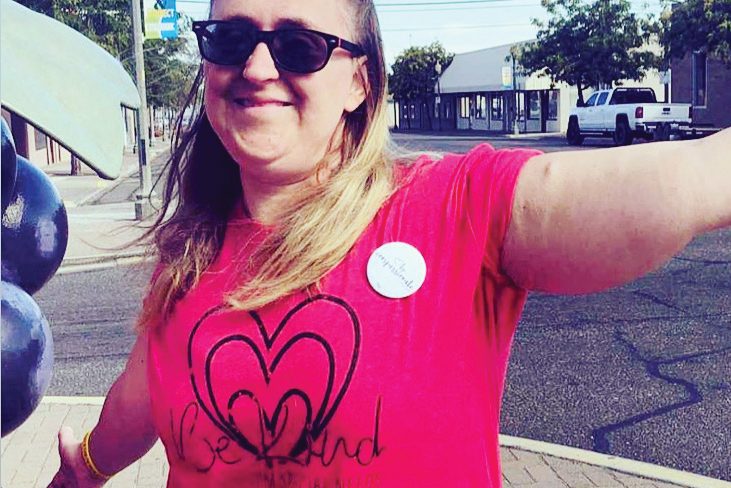
Home » Family’s foundation strives to put more kindness into world
Family’s foundation strives to put more kindness into world

March 16, 2020
Their line of wearables tries to raise awareness, promote thoughtfulness toward people with special needs
The button idea really was a simple one.
Yet it took a Tri-City couple, Michael and Linde Thomas, more than 20 years to turn it into reality.
The Thomases recently created a foundation called Kindhearted for Special Needs.
They offer a line of products—buttons, lanyards and T-shirts, so far—that say things such as, “Be patient, I have Special Needs,” and “Please be Kind, I have Special Needs.”
The products aim to raise awareness and promote thoughtfulness toward people with disabilities.

“Our biggest hope of all is that people will be kindhearted towards their fellow children, men, women, students, or whoever they may encounter with special needs,” their website says,
The Tri-City couple have three adult daughters: Genesis, 30; Sarai, 26; and Michaela, 25.
Their middle child was diagnosed with neurofibromatosis, which are little tumors on her brain stem. These growths on the nerve endings can affect learning, balance, sight and hearing, among other functions.
Linde said she was in shock at the diagnosis.
“You wouldn’t know she was special needs by just looking at her,” she said.
For years, Michael and Linde tried to handle the problem themselves, and they spent a lot of time trying to explain Sarai’s condition to people over and over.
“A lot of people as parents see the problem and try to solve it for their kids. You’re in denial,” Michael said.
The disease affected Sarai’s ability to learn and mature. Numbers and words would jump around before her eyes and her attention span was short. Her maturity level will never be higher than at fifth-grade level, her parents said.
Sarai, normally sweet and friendly, gradually became scared of people and quit talking to anyone. Teachers accused her of being lazy.
She found an interest in collecting Barbies, creating characters and stories about them.
Her parents, who owned a furniture store for 20 years, had always tried to keep at least one parent with Sarai to protect her.
“We spent 20-something years being this buffer around her,” Michael said.
Today, the couple work as real estate agents for Retter & Company Sotheby’s International Realty in Kennewick, allowing them more flexibility in caring for Sarai when needed.
But it seemed that whenever Sarai was able to take a few steps toward independence, she experienced a setback—like when she rode a three-wheel bicycle her grandfather made for her to the corner store with her two dogs in tow on leashes. A neighbor came outside and yelled at Sarai because her dogs had gotten out and she threatened to have them taken away. Sarai quit riding her bike.
Then there was the time she went to a store, bought a Barbie and was able to use the self-checkout stand to pay for it —only to set off the alarm while leaving the store.
As Linde recounts: “Security wanted to see the receipt. Her mind went blank, and she couldn’t find her receipt.”
Surrounded by security, they realized her phone had set off the alarm and let her go.
But she was terrified because she thought she was going to jail and would never see her family again.
This was a few years ago.
But it was at this point Mike and Linde remembered a trip they took with the girls to Disneyland.
On birthdays, visitors receive “Today is my birthday” buttons so Disney cast members can enthusiastically greet them with well wishes.
Why not try that same tact with a special needs button?
“It’s a safety thing,” Michael said. “So we developed a button. Try this.”
Sarai didn’t want to wear one at first, and it took some convincing from her parents.
But then something magical happened: She wasn’t invisible anymore.
She went to a grocery store to buy food, and a woman noticed the button and politely engaged her in conversation.
“It only took one time for her to wear that button,” Linde said. “She wore a shirt to Walmart. Nobody had talked to her. But suddenly people talked to her.”
“It made such a difference right away,” Michael said. “You know, everyone is so focused on their own stuff. But you see people stop and the shift in the eyes of everyone.”
Sarai was excited with that first reaction, and wears them everywhere now: movie theaters, parks, restaurants and stores.
Immediately, the Thomases started the foundation called Kindhearted for Special Needs.
They said they recently received their 501(c)3 status.
And they’ve gotten national and international exposure about their work.
“We’ve had people donate to us,” Linde said. “An amusement park is interested in our products.”
Their Instagram account now has more than 17,500 followers.
Linde and Mike sometimes are invited to speak about their experience at different events.
Linde says that nearly 54 million Americans cope with disabilities, whether physical, sensory or intellectual.
And some of their special needs may not be readily visible.
And that may be why Kindhearted for Special Needs has taken off.
And the couple isn’t done.
They’ve developed a VIP badge that contains no metal for use in airport security checkpoints, which can be a stressful situation for people with special needs.
“It’s called a Kindhearted VIP special pass,” Linde said. “Kind of like a speed pass at airports. We need to work with TSA on it.”
The best part of this story is Sarai, who has found her niche.
“After she was done with school, we were like, ‘Where do we go from here because even school was so hard,’” Linde said.
But a family friend asked if Sarai would be interested in working at a day care. She’s been there for a while now.
“The kids adore her,” Linde said. “She could engage with them better than most adults who didn’t have the patience.”
Most people want to be good people and these conversation-starter wearables give them an opportunity to be, Linde said.
For years, the family had tried to educate people that Sarai needed extra time, a little more patience, assistance and compassion. Now, their products help to do this work.
Their “Thank you for being kind... I’m special needs” button has made Sarai’s world a better place—one person at a time.
The buttons cost $5; lanyards $9; and shirts $20.
Kindhearted for Special Needs: kindhearted4specialneeds.com; Instagram; Facebook.
Business Profiles Local News
KEYWORDS march 2020




